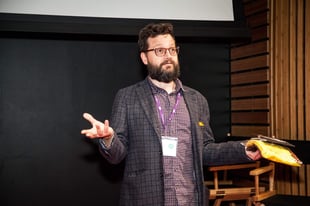

ANIMAFEST PRO | ANIMAFEST SCANNER VII | SIMPOZIJ O SUVREMENOJ ANIMACIJI | Panel 1 - HEAVY LIKE THE WORLD: ANIMATION IN THE WORLD OF CHAOS
KEYNOTE: Heavy Like the World – Did Animation Stop Being Funny? - Chris Robinson (Animafest Award for Outstanding Contribution to Animation Studies)
As long as I can remember (granted, there’s a lot I don’t remember), I’ve heard criticisms (i.e. moaning) about how animation films are too dark. Some of it was within the context of selections for the Ottawa International Animation Festival, but it’s also been a familiar, more general, refrain through the years. This has bothered me for a variety of reasons that I would like to elaborate on:
1. Why is animation obliged to be comic? There is this baffling and inherent (systemic comicism/humourism) belief that animation (you know...’cartoons’) is by nature comic. We describe any animation that’s not for kids (and strangely not for adults) as ‘adult animation’ (the target audience is probably teens and young adults). Yet, do you ever hear someone describe, say, a Jarmusch or Andersson or Kaurismäki film as ‘adult cinema’? No, ‘adult cinema’ has a whole other (erotic) connotation.
2. There is actually a lot of humour in animation films.... There are also different types of comedy. Maybe it’s a bit darker, surreal, satirical, absurd or conceptual. Comedy is much more than slapstick.
3. Good comedy is a lot harder to craft than great drama.
4. Maybe it’s the audience that has no sense of humour. Phil Mulloy’s films, for example, can be bitingly hilarious, but not everyone sees that.
5. Or, hey, maybe you’re right. Maybe animation has become way too precious and insular for its own good and ours. Do animators need to remove the imaginary stick that appears to be stuck up their rumps and laugh at the world and themselves a bit more?
Let’s discuss.
Chris Robinson is a Canadian writer and author. He is also the Artistic Director of the Ottawa International Animation Festival (OIAF) and is a well-known figure in the animated film world. He made a name for himself with a unique and eclectic magazine column Animation Pimp, which became a book of the same name (the column was later renamed into Cheer and Loathing in Animation). Mastering different methods and styles in critical and scholarly approaches, Robinson covers a broad range of Canadian and global subject matters in his books Estonian Animation: Between Genius and Utter Illiteracy, Unsung Heroes of Animation, Canadian Animation: Looking for a Place to Happen, Ballad of a Thin Man: In Search of Ryan Larkin, Animators Unearthed, and Japanese Animation: Time out of Mind. In addition to his writing on animation, Robinson also wrote the Award-winning animated short, Lipsett Diaries (2010), directed by Theodore Ushev. More recently, he finished My Balls are Killing Me, a graphic novel about his scrap with cancer, with artist, Andreas Hykade, along with Drivin’, a live action film directed by Theodore Ushev.


